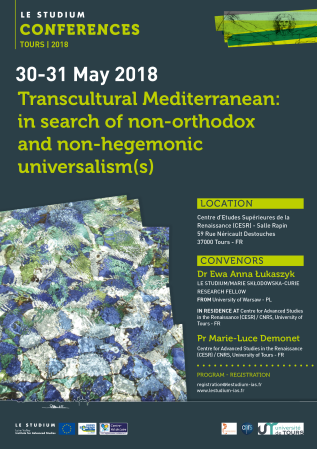Transcultural Mediterranean: in search of non-orthodox and non-hegemonic universalism(s)
Centre d’Etudes Supérieures de la Renaissance (CESR) <br/> Salle Rapin
59 Rue Néricault Destouches
37000 Tours
France
Presentation
The aim of this conference is to create a space of discussion concerning the transcultural dimension of the Mediterranean understood as a region defined, in the first place, by the phenomena of exchange and circulation of ideas. The Mediterranean crossroad between Europe, Middle East and Africa, fully established already at the end of Antiquity, takes a new shape at the brink of late Middle Ages and early Modernity. The proposed approach is to identify the spheres of interference between the Islamic and Christian worlds (contemplated in their plurality and mutual inter-penetrability). Tracing a relation between culturally locatable origins and the hypothetical transcultural consequences of such processes of interference, we might come to important conclusions, valid not only for the history of ideas as an academic discipline, but also for the contemporary perception of the shared Mediterranean heritage.
The transcultural hypothesis the organizers would like to propose as a discussion topic deals with the aspiration of transcending the cultural and confessional division, undoubtedly predominating in the Mediterranean world during the contemplated period (that may be taken as broadly as going from the 11th to the 17th century). Many European and Mediterranean figures, such as Ibn Arabi, Ramon Llull, Guillaume Postel or John Dee appear to have fallen in the temptation of moving into the interstices between the culturally established and delimited orthodoxies. By what spiritual and intellectual means did they attempt to inhabit those unstable zones? Did they leave behind any blueprint of a non-hegemonic universalism that might be recuperated in our times, helping to build a harmonious future of the region? Is there a diagram of transgressive relationships across the plurality of cultures, denominations and intellectual traditions to be read in the variegated Mediterranean heritage?
Key Topics
Circulation of ideas; universalism; intercultural and inter-confessional translation; scholarly travellers and travels; interference of philosophical languages and systems of thought; mysticism and other non-orthodox forms of religious thought; wandering forms of magical culture; intellectual and religious transgression.
Convenors
- Dr Ewa A. Łukaszyk, LE STUDIUM / Marie Skłodowska-Curie Research Fellowship
FROM Faculty "Artes Liberales" / University of Warsaw - PL
IN RESIDENCE AT Centre for Advanced Studies in the Renaissance (CESR) / CNRS, University of Tours - FR - Pr Marie-Luce Demonet,
Centre for Advanced Studies in the Renaissance (CESR) / CNRS, University of Tours - FR
Scientific Commitee
- Pr Marie-Luce Demonet, Centre for Advanced Studies in the Renaissance (CESR) - FR
- Pr Marek Dziekan, University of Lodz - PL
- Dr Ewa Łukaszyk, University of Warsaw - PL
Slideshow
Confirmed speakers
- Dr Patricia Benstein, The University of Western Australia - AU
- Dr Joanna Gorecka-Kalita, Jagiellonian University - PL
- Pr Josep Enric Rubio Albarracín, University of Valencia - ES
- Dr Michela Salsano, University of Salerno - IT
- Pr Stefan Sperl, SOAS University of London - UK
- Pr György Endre Szönyi, Central European University Budapest - HU
- Dr Natalia Wawrzyniak, Le Mans University - FR
Location
The conference venue is unique. Located right next to the basilica of St Martin in the old city centre of Tours, the Centre d'Études Supérieures de la Renaissance (Centre for Advanced Studies in the Renaissance) is a teaching and research institution which welcomes students and researchers seeking initial or supplementary instruction in all aspects of the Renaissance. The Centre was initially constituted in 1956 on the basis of a library and a documentary archive, supplemented by a collection of photographs and databases. It is now a venue for multi-disciplinary instruction, which, in association with the various Faculties of the University, has responsibility for teaching and research in History, History of Art, Literature, Languages, Musicology, and Philosophy. It currently leads a large research programme dedicated to the cultural regional heritage (Intelligence des Patrimoines). As a research centre it brings together fifty or so researchers committed to the investigation of the "civilization of the Renaissance" from Petrarch to Descartes. Participants will be welcomed in this exceptional surrounding blending Middle Age and Renaissance cultures and will have the opportunity to discover French cuisine and wines.
Conference Program
Wednesday May 30th 2018
- 14:30 Welcome coffee & registration
- 15:00 Official Opening: Sophie Gabillet (Le Studium) & Pr Marie-Luce Demonet (CESR, University of Tours)
- 15:30 Pr György Szönyi - Enoch/Idris, Postel, and the Universal Reform
- 16:30 Pr Marie-Luce Demonet - Rabelais' encounter with Adam: naming world culture
- 17:30 Discussion & Coffee break
- 18:30 Public Lecture in French : Pr Josep Enric Rubio Albarracín, Ramon Llull, ou comment communiquer avec l'autre
- 20:00 Dinner - Le Barju
Thursday May 31st 2018
- 08:45 Welcome coffee
- 09:00 Dr Joanna Gorecka-Kalita - The Hermit and the Maiden. The longevity of a transcultural literary topos
- 10:00 Pr Stefan Sperl - In Search of Harmony. Reflections on the Transcultural Dimension of Neoplatonism
- 10:50 Discussion & Coffee break
- 11:30 Dr Michela Salsano - The influence of Aristotle’s Arabian commentators on the philosophy of Scholasticism and first Humanism
- 12:30 Lunch - La Table du Grand Marché
- 15:00 Dr Patricia Benstein - The concept of the divine and the perfect human being in the doctrine of Ibn Arabi (online from Australia)
- 16:00 Dr Natalia Wawrzyniak - Seven Wise Men and a Friendly Exchange: Universalism as a Mediterranean Tale
- 17:00 Discussion & Coffee break
- 17:30 Dr Ewa Lukaszyk - What is the concept of the transcultural Mediterranean for?
- 18:30 Closing remarks
- 19:30 Dinner - L'Atelier Lebeau
PRICING
Including one dinner, one lunch and the coffee breaks
| Public Institutions | 75 EUR |
| Students | 50 EUR |
| Social dinner | 55 EUR |









